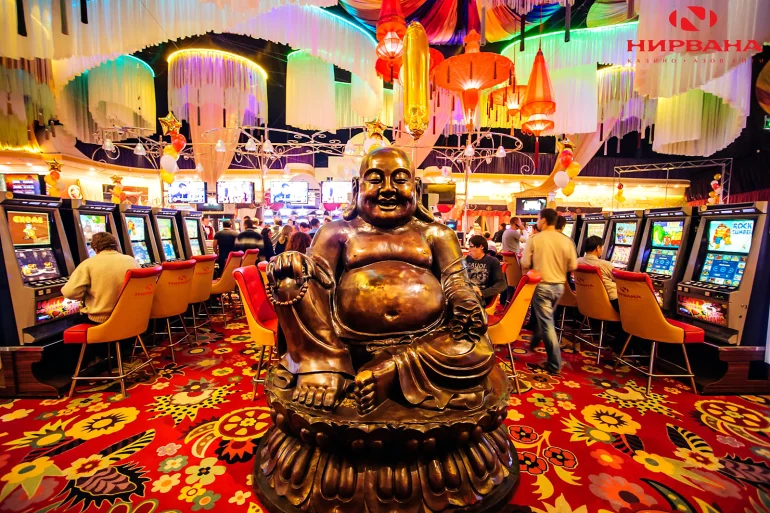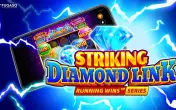_770.webp)
Nirvana Casino became the third legal gambling entertainment to open in the territory of the Russian Federation since the adoption of the law, according to which such activities are permitted only in the four areas designated for this purpose. We are going to remind you that it was adopted on July 1, 2009. The casino operated in the gambling zone of Azov City, which was the first of its kind in Russia.
Brief History
Everything started with the Law on State Regulation of the Organization and Conduct of Gambling Activities and on Amendments to Certain Legislative Acts. Then the boundaries of four zones were determined:
- Azov-City,
- Primorye,
- Siberian Coin,
- Yantarnaya.
Areas of the Rostov and Krasnodar regions were initially allocated for Azov City, but later the area in the Rostov region was cancelled.
In early 2010, the first gambling establishment, Oracle, was launched in Azov City. It was owned by the company Royal Time. The second casino, called Shambala, owned by the closed Joint-Stock Company of the same name, started its operations in the autumn of the same year.
Another establishment called Nirvana, which JSC Shambhala also founded, opened its doors to visitors in October 2013. Its construction lasted nine months, and it cost more than two hundred million rubles.
The history of Nirvana Casino since 2014 is intrinsically linked to the fate of the Azov City gambling zone in Russia. In 2014, Nirvana Casino was one of three operational casinos within Azov City, a designated gambling zone in the Krasnodar region. It, along with "Oracul" and "Shambala," was attracting a significant number of visitors. For example, in the first five months of 2014, Nirvana Casino had over 35,000 visitors. The Azov City zone was initially successful, with reports indicating that it was the most profitable gambling zone in Russia in 2016.
-
NameSoftEditors ratingReturn to playerBetMax payoutVariance
-
 0.096.1 %0.25 - 250 €x5000Middle
0.096.1 %0.25 - 250 €x5000Middle -
 6.596.0 %0.2 - 100 €x1000Low
6.596.0 %0.2 - 100 €x1000Low -
 7.396.1 %0.2 - 200 €x100000High
7.396.1 %0.2 - 200 €x100000High -
 6.695.1 %0.3 - 30 €x3000Middle
6.695.1 %0.3 - 30 €x3000Middle -
 7.095.6 %0.2 - 200 €x10000Middle
7.095.6 %0.2 - 200 €x10000Middle -
 6.496.1 %0.01 - 170 €x300Low
6.496.1 %0.01 - 170 €x300Low -
8.195.0 %0.1 - 25 €x10000High
-
9.496.1 %0.3 - 180 €x1500High
-
7.795.0 %0.1 - 50 €x5000High
-
7.795.5 %0.25 - 250 $x7600Middle
-
7.095.8 %0.1 - 200 $x5000Low
-
7.596.2 %0.1 - 100 $x3000Middle
-
7.296.0 %0.2 - 30 $x7500Middle
-
7.296.5 %0.2 - 240 $x10000High
-
 7.296.1 %0.1 - 25 €x10000Middle
7.296.1 %0.1 - 25 €x10000Middle -
7.596.5 %0.2 - 240 $x10000High
-
7.795.0 %0.1 - 25 $x10000High
-
 6.796.0 %0.1 - 100 €x10000Low
6.796.0 %0.1 - 100 €x10000Low -
 7.296.1 %0.2 - 16 €x150000High
7.296.1 %0.2 - 16 €x150000High -
 7.495.6 %0.25 - 125 €x2000High
7.495.6 %0.25 - 125 €x2000High
However, a shift in government policy following the 2014 Winter Olympics in Sochi began to seal the fate of Azov City. To help recoup the massive investments made in Sochi's infrastructure, the Russian government decided to establish a new gambling zone in Sochi, also within the Krasnodar Territory. Under existing Russian law, a single constituent entity (like a region) could only have one designated gambling zone. This meant that the continued operation of Azov City became incompatible with the new Sochi gambling zone.
Despite initial hopes from casino operators in Azov City that they might be allowed to continue, or that the law would be amended, the decision to close Azov City gained momentum. In 2014, a law was passed that specifically prohibited gambling zones from operating in areas outside of Sochi within the Krasnodar region. Although a deadline of April 1, 2015, was initially set for operators to vacate, some took to the courts to seek reimbursement for their investments, leading to extensions.
By May 2016, Russian President Vladimir Putin signed a law officially liquidating the Azov City gambling zone, with a final closure date set for January 1, 2019. This decision was met with criticism from investors and experts who argued it could deter international operators from investing in the Russian market and would lead to significant job losses. Companies like Shambala, which also operated Nirvana Casino, attempted to contest the ruling and sought compensation for their losses, with some legal proceedings continuing for a period.
As a result, Nirvana Casino, along with the other casinos in Azov City, ceased operations by the end of 2018, as the gambling zone was officially shuttered. The owners of these casinos were expected to receive compensation for their financial losses, with the Russian Ministry of Finance indicating efforts would be made to facilitate this. The closure of Azov City marked a significant turning point in Russia's gambling industry, as the focus shifted to developing newer gambling zones like Sochi and Primorye in the Far East.
_770.webp)
Gambling in Nirvana Casino
The casino, managed by Maxim Smolentsev, occupied 1,500 square meters, featuring more than 250 slot machines from leading brands and a few tables for popular gambling games, including roulette, craps, baccarat, blackjack, and poker.

Regular customers could apply for the player's card. Bonus points were accrued for bets made. It also gave users an opportunity to get tickets for draws of valuable gifts, become owners of additional benefits, count on a certain cashback, and even pay for various services.

Additional Services
Nirvana offered not only entertainment for gambling enthusiasts, but also the opportunity to savor delicious dishes at the restaurant, watch a movie on the huge screen, and simply relax.
_770.webp)
The casino offered a complimentary transfer from the hotel "Rostov" in Rostov-on-Don and the shopping and entertainment complex "Red Square" in Krasnodar. Moreover, customers who used this offer on any day from Monday to Thursday received coupons for playing video slots (with a nominal value of 500 rubles).
_770.webp)
Conclusion
The journey of Nirvana Casino, from its promising beginnings in the Azov City gambling zone to its eventual closure, serves as a compelling illustration of the dynamic and sometimes unpredictable nature of Russia's gambling regulation. For several years, Nirvana stood as a significant player within Azov City, offering a diverse gaming experience and contributing to the zone's initial success as a gambling destination. It provided employment and attracted visitors, becoming a key part of the local entertainment offering.
However, the strategic decision to establish a new gambling zone in Sochi, driven by broader economic and political considerations, ultimately led to the legal necessity of closing Azov City. This unforeseen development, despite the significant investments made by operators like Nirvana's owners, underscored the inherent risks associated with operating in a heavily regulated and evolving market.
The closure of Nirvana Casino, along with its counterparts in Azov City, marked the end of an era for that particular gambling zone and shifted the focus of Russia's gambling operations to other designated areas. The story of Nirvana Casino thus highlights not only the commercial aspirations of its operators but also the profound impact of governmental policy on the viability and longevity of enterprises within the Russian gaming sector.


































